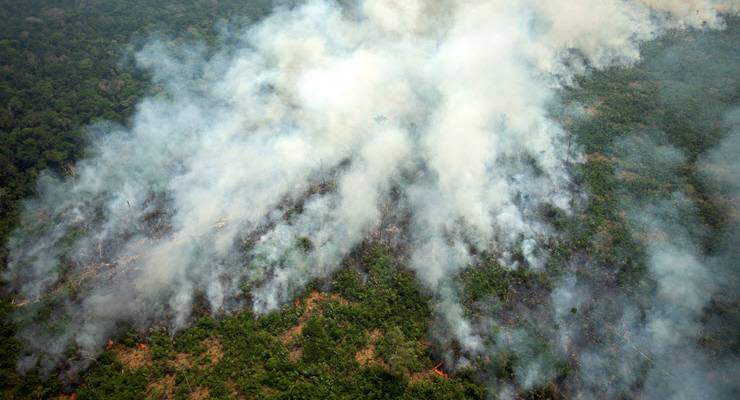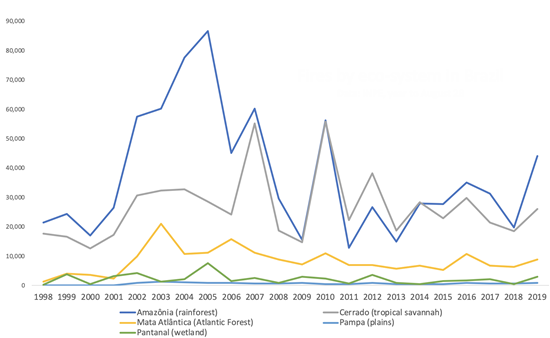
In Sao Paulo, on August 19, day turned into night. The sun was blocked as smoke blew in, and the pictures went around the globe.
The fires in the Amazon rainforest are part of the process of land clearing, and they are a regular feature of the dry season, but this year’s fires are worse than they have been for several years as land clearing increases under the new regime of Brazilian President Jair Bolsonaro.

That smoky week in Sao Paulo was also the week of the G7 summit and, at its conclusion, the G7 offered US$20 million to Brazil to help manage the fires. The sum was a trivial fraction of a percent of their aid budgets, and the whole world could see it.
Just for reference, "Boss Baby" cost $200 million https://t.co/7wBMXI3GmC
— hussein kesvani (@HKesvani) August 26, 2019
The aid offering was essentially a symbolic amount — a way to draw attention to the policies of Brazil’s anti-Amazon Bolsonaro government. That approach proved, shall we say, counter-productive.
“What they want is our sovereignty … we have to unite to preserve what is ours and guarantee our sovereignty,” the president said.
So who gets to choose what happens to the Amazon? Brazil or the rest of us? And how best can we (people who also depend on it) influence the result?
Aid is never just charity
The relationship of aid and sovereignty is one dear to my heart. I was once deployed to Nauru as an Australian official, where I helped the government assemble its meagre annual budget.
I was “on island” when the Pacific Solution was in abeyance, so I did not share the island with asylum seekers. But Australia’s policy of internment was the direct explanation for my presence. Australian aid — including what they call technical assistance, like foreign experts — was part of a package put together to help convince Nauru to host an asylum seeker detention centre.
Indeed, most of the funds I allocated in that budget were aid funds, and they came with various conditions. Vote for Taiwan at the UN, host Australian asylum seekers, etc, etc. Aid has a major political aspect. And the recipients know it. If they eat a free lunch, they do so reluctantly, and warily. Brazil is not wrong to think that aid comes with conditions.
The problem is, in this case, that what we want Brazil to do is what’s best for all of us.
Global assets and national decisions
Westphalian sovereignty — the idea each country is sovereign over its domestic affairs — is a very useful concept that has facilitated several centuries of relative peace. It is not, however, without downsides. The issue of one country’s sovereignty becomes fraught where it relates to something other countries depend on.
We see this in cases where the asset lies predominately in one country’s borders (such as the Great Barrier Reef or the Amazon rainforest) but also in assets that are global (like the oceans and the atmosphere). The rights of a country to do what it wants are often at odds with the interests of the rest of the world.
That’s where global agreements come into effect. But an agreement must have two sides, and without willing participation from Brazil, global efforts to protect the Amazon will flounder.
Norway has thrown enormous sums into an “Amazon Fund”, which helped produce enormous improvements in deforestation from their peaks in the early 2000s to the low levels seen in the last decade. The fund may be Norwegian money, but it is very much a Brazilian project, managed and run domestically. That’s the sort of approach that overcomes concerns about sovereignty.
All the academic studies show that foreign aid helps. But that only applies when it intersects with local willingness. Small, symbolic, high-pressure donations from distant foreign leaders are not the way to influence places like Brazil (or the US, or even Queensland) where national pride and claims about lost sovereignty are political dynamite.
If we want to help national governments to make decisions in the global interest, the best approach is to let the money talk, and have the politicians stay silent.








I do not think Bolsonaro wants to put it out. He’d rather it burnt so his mates get what they want.
What needs to be done is a complete boycott of stuff from the Amazon. We need journalists and others to investigate where products from the Amazon originate and for us to refuse to buy those products and their derivatives. This destruction of the Amazon forest is a disaster for the planet.
I had to laugh when I saw the that $20M was to cover “reafforestation projects”.
I wonder if we could get some of that blue-eyed oil money to stop us land clearing the tiny vestiges of tree cover that remain west of the Sandstone Curtain?
An even greater tragedy lies in adjoining countries to Brasil. Bolivia has the magnificent Parque Nacional Noel Kempff Mercado which shares a border with Brasil. I don’t know if the current fires have reached this border yet. However, given the lunatic attitude of the Bolsonaro government it is only a matter of time.